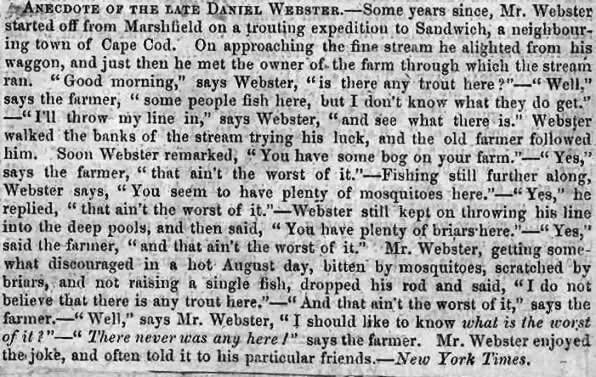The Younger days of the Hon Daniel Webster (1782-1852) - American 19th century Politician.
EVENING STAR
THE WEBSTER FAMILY.
In the New York Journal of Commerce we find the following incident in the younger days of the late Hon Daniel Webster. Doubtless some of our readers may have read it. Still it will always be found interesting as it proves how the finer feeling were inherent in his nature, and shone forth conspicuously at an early period in the life of that truly great and good man.
Ebenezer Webster, the father of Daniel, and a farmer. The vegetable in his garden The vegetables in his garden had suffered considerably from the depredations of a woodchuck, whose hole and habitation was near the premises. Daniel, some ten or twelve years old, and his older brother Ezekiel, had set a trap and finally succeeded to kill the animal and end at once all further trouble from him; but Daniel looked with compassion upon his meek, dumb captive, and offered to let him again go free. The boys could not agree, and each appealed to their father to decide the case. "well my boys", said the old gentleman, "I will be the judge. There is the prisoner," (pointing to the woodchuck,) "and you shall be counsel and plead the case for and against his life and liberty."
Ezekial opened the case with a strong argument, urging the mischievous nature of the criminal, the great harm he had already done and said that much time and labor had been spent in his capture, and now it he suffered to live and go on again at large, he would renew his depredations, and be cunning enough not to suffer himself to be caught again, and that to make the most of him they could, it would not repay half the damage he had already done. His argument was ready, practical, to the point, and of much greater length than our limits will allow us to occupy, in relating the story.
The father looked with pride upon his son, who became a distinguished jurist in his manhood “Now, Daniel, it is your turn; I’ll bear what you have to say.”
`Twas his first case. Daniel saw that the idea of his brother had sensibly affected his father, the judge, and as his large, brilliant black eyes looked upon the soft, timid expression of the animal, and as he saw it tremble with fear in its narrow prison house, his heart swelled with pity, and he appealed with eloquent words that the captive might again go free. God, he said, had made the woodchuck; he made him to live, to enjoy the bright sunlight, the pure air, the free fields and woods. God had not made him to, or anything in vain; the woodchuck has as much right to live as any other living thing – he was not a destructive animal, as the wolf and fox were; he simply ate a few common vegetables of which they had plenty and could well spare a part; he destroyed nothing except the little food he needed to sustain his humble life; and that little food was as sweet to him; and as necessary to his existence, as was to them the food upon his mother’s table. God furnished their own food; he gave them all they possessed, and would they not spare a little for the dumb creature, who really had as much right to his small share of God’s bounty as they themselves had to their portion? Yea, more; the animal had never violated the laws of his nature or the laws of God, as man often did; but strictly followed the simple, harmless instincts he had received from the Creator of all things. Created by God’s hand, he had a right, a right from God, to life, to food, to liberty; and they had no right to deprive him of either. He alluded to the mute but earnest pleadings of the animal for that life, as dear to him as their own was to them; and the just judgment they might expect if in selfish cruelty and cold heartlessness they took the life they could not restore again, the life that God alone had given.
During this appeal the tears has started to the old man's eyes, and were fast running down his sun burnt cheeks; every feeling on a father's heart was stirred within him; he saw the future greatness of his son before his eyes; he felt that God had blessed him and his children beyond the lot of common men; his pity and sympathy were awakened by the eloquent words of compassion, and the strong appeal for mercy; and forgetting the Judge in the man and father, he sprang from his chair (While Daniel was in the midst of his argument, without thinking he had all ready won the case.) and turning to his older son, dashing the tears from his eyes, he claimed, "Zeke, Zeke, you let that woodchuck go."

